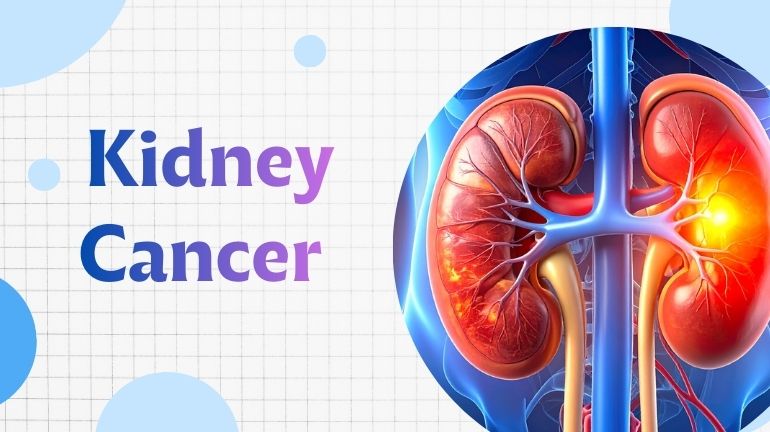
Kidney Cancer
Kidney cancer is a disease in which the cells of the kidney begin to grow uncontrollably and form a mass or tumor. The most common type is Renal Cell Carcinoma (RCC), which accounts for nearly 85–90% of adult kidney cancers.
It usually starts in the lining of the renal tubules, the tiny tubes in the kidney that filter blood and produce urine.
Kidney cancer can remain localized in the kidney for a long time, but in advanced stages, it can spread (metastasize) to the lungs, bones, liver, or brain.
Early-stage kidney cancer is often asymptomatic and is sometimes detected incidentally during imaging for other conditions.
- DNA mutations in kidney cells lead to uncontrolled cell growth and tumor formation.
- Inherited genetic syndromes (e.g., Von Hippel-Lindau disease, hereditary papillary RCC).
- Smoking: Carcinogens damage kidney cell DNA and double cancer risk.
- Obesity: Hormonal imbalance and chronic inflammation trigger abnormal cell growth.
- Occupational exposure: Cadmium, asbestos, solvents increase cancer risk.
- Long-term dialysis for chronic kidney disease.
- High blood pressure (hypertension).
- Use of certain painkillers or drugs over long periods.
- Agnimandya (weak digestive fire) → Ama (toxin accumulation).
- Mutravaha srotas dushti (urinary tract imbalance).
- Viruddhahara (wrong food combinations), Ati-madyapana (alcohol), and Vega-dharana (suppression of urine urge) weaken kidney health.
Causes of Kidney Cancer
The exact cause is not fully understood, but several genetic, lifestyle, and metabolic factors contribute:
Cellular & Genetic Factors
Lifestyle & Environmental Factors
Medical Factors
Ayurvedic Understanding (Nidanas)
Types of Kidney Cancer
- Renal Cell Carcinoma (RCC): Most common type (85%). Subtypes: clear cell RCC, papillary RCC, chromophobe RCC.
- Transitional Cell Carcinoma (TCC): Starts in the renal pelvis (urine collecting area). Linked with smoking and chemical exposure.
- Wilms’ Tumor: Affects mainly children (under 5 years). One of the most common pediatric cancers.
- Renal Sarcoma: Very rare. Arises from connective tissues or blood vessels of the kidney.
Risk Factors of Kidney Cancer
Several conditions and lifestyle factors increase the likelihood of developing kidney cancer:
- Age: Most cases occur after age 50.
- Gender: Men are affected more than women (2:1 ratio).
- Smoking: Significantly increases risk, especially for RCC and TCC.
- Obesity & Metabolic Syndrome: Hormonal and insulin resistance changes promote tumor growth.
- Hypertension: Both high blood pressure and certain anti-hypertensive medications are linked to increased risk.
- Family History: Inherited syndromes like Von Hippel–Lindau disease, hereditary papillary RCC, and Birt–Hogg–Dubé syndrome.
- Chronic Kidney Disease & Dialysis: Long-term dialysis patients have higher risk.
- Occupational Hazards: Prolonged exposure to asbestos, cadmium, petroleum products, and certain solvents.
- Unhealthy Diet: Excessive intake of processed meats, high-fat diet, alcohol, and low intake of vegetables/fruits.
Signs & Symptoms of Kidney Cancer
- Hematuria (Blood in urine): Most common symptom, may appear intermittently.
- Flank Pain: Persistent pain in the side, lower back, or abdomen.
- Palpable Lump: A hard mass in the kidney region (sometimes felt in advanced cases).
- Unexplained Weight Loss & Fatigue: General sign of cancer progression.
- Fever: Low-grade fever not linked with infection.
- Swelling in Legs/Ankles: Due to reduced kidney function.
- Hypertension or Anemia: Resulting from altered kidney function and hormone regulation.
- Note: Many cases are discovered incidentally during ultrasound or CT scans for other health issues.
Ayurveda’s Perspective on Kidney Cancer
In Ayurveda, kidney cancer is understood in relation to Mutravaha Srotas Vikara (urinary system disorders), Arbuda (malignant tumors), and Granthi (abnormal growths).
Nidana (Causes):
1.Viruddhahara (incompatible foods) such as heavy meats, excess salt, and fermented foods.
2.Ati-madyapana (excess alcohol) and drug abuse.
3.Vega-dharana (suppression of natural urges, especially urine).
4.Poor digestion (Agnimandya) leading to Ama (toxin buildup).
Samprapti (Pathogenesis):
1.Agnimandya → Ama accumulation → Rakta and Meda Dhatu dushti.
2.Ama blocks Mutravaha srotas → Granthi/Arbuda formation in kidneys.
3.Dosha imbalance (Kapha + Vata) predominates, causing abnormal tissue proliferation.
Principles of Management:
1.Shodhana (Detoxification): Panchakarma (Basti, Virechana, Raktamokshana in selective cases).
2.Shamana (Pacification): Herbal medicines with anticancer and anti-inflammatory actions.
3.Rasayana Therapy: To strengthen immunity, protect kidneys, and prevent recurrence.
Kidney Cancer Treatment at Nageswara Ayurvedic – Role of Zingiber officinale
At Nageswara Ayurvedic, kidney cancer treatment emphasizes holistic healing through detoxification, dosha balance, kidney protection, and immunity enhancement.
*Zingiber officinale (Ginger) is a central herb used in therapy.
*It acts as a Rasayana, offering plant-based calcium, phosphorus, and magnesium that nourish kidney tissues.
*Gingerols and shogaols in ginger possess anticancer, antioxidant, and anti-inflammatory properties.
*It improves digestion, eliminates Ama, supports nutrient absorption, and enhances systemic immunity.
*Regular use strengthens renal function and reduces oxidative stress in kidney cells.
Zingiber officinale in Kidney Cancer Care
Anticancer Action: Ginger’s active compounds induce apoptosis (natural cell death) in kidney cancer cells.
*Renal Protection: Reduces oxidative stress, inflammation, and prevents tissue damage.
*Mineral Support: Provides natural calcium, magnesium, and phosphorus essential for tissue repair.
*Digestive Enhancer: Strengthens Agni, prevents Ama accumulation, and improves metabolism.
*Systemic Benefits: Helps control nausea, loss of appetite, and chemotherapy-induced side effects.
Treatment Relevance at Nageswara Ayurvedic – Kidney Cancer
At Nageswara Ayurvedic, kidney cancer management is guided by a holistic protocol that integrates herbal formulations, mineral-based Rasayana support, and lifestyle correction. The focus is on clearing obstructions in Mutravaha Srotas (urinary channels), protecting renal tissues, and enhancing overall vitality while complementing modern therapies.
1.Herbal Integration
The core herb Zingiber officinale (Ginger) is combined with kidney-protective herbs such as Ashwagandha, Parsley, Punarnava, Varuna, Gokshura, Bearberry (Uva Ursi), and Haridra (Turmeric). Together, these herbs reduce inflammation, improve renal circulation, enhance urine flow, and support kidney detoxification.
2.Rasayana Support with Plant-Based Minerals
Special Rasayana formulations are enriched with plant-based minerals that provide renal protection and promote cellular regeneration:
Magnesium (Moringa Leaves Extract 1.0%) – Maintains electrolyte balance and supports kidney filtration.
Potassium (Moringa Leaves 5.0%, Guava Leaves 3.0%) – Regulates fluid balance and reduces kidney stress.
Iron (Curry Leaves Extract 3.5%) – Prevents anemia common in kidney cancer patients.
Zinc (Guava Leaves Extract 4.0%) – Enhances immunity and tissue healing.
Copper (Sesame Seed Extract 0.5%) – Provides antioxidant protection for renal cells.
Manganese (Bay Leaves Extract 1.0%) – Supports enzymatic repair and detoxification.
Selenium (Mustard Seed Extract 0.5%) – Protects kidneys from oxidative damage caused by chemo or toxins.
Sodium (Basil Extract 5.0%) – Maintains hydration and nerve-muscle coordination.
These minerals, sourced from plants, ensure bioavailability without the risks of heavy metal toxicity, making them safe for long-term Rasayana therapy.
3.Focus on Mutravaha Srotas
Treatment emphasizes cleansing and strengthening the Mutravaha Srotas, clearing obstructions, regulating urine output, reducing swelling, and maintaining renal function.
4.Holistic Care
Herbal-mineral formulations support patients undergoing surgery, chemotherapy, or targeted therapy by reducing nausea, fatigue, edema, and loss of appetite. They protect the kidneys against treatment-induced toxicity and enhance recovery.
5.Long-term Goal
The ultimate aim of kidney cancer management at Nageswara Ayurvedic is to restore balance, prevent recurrence, and improve quality of life by integrating Ayurvedic Rasayana principles with safe, plant-based mineral support.
